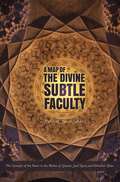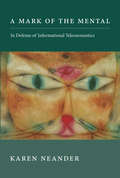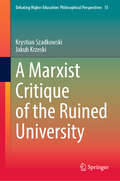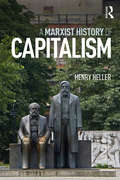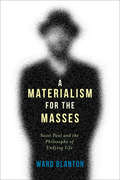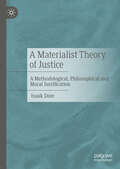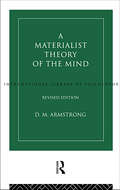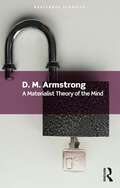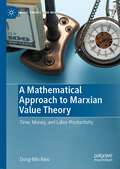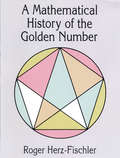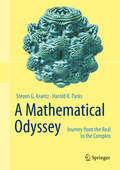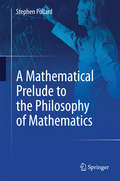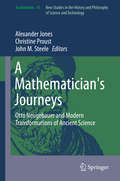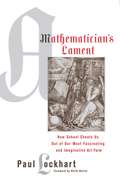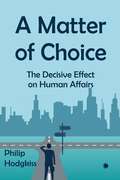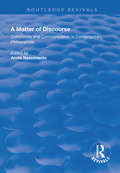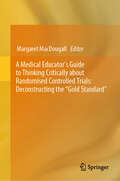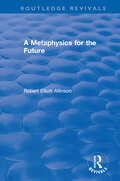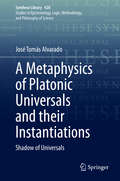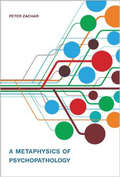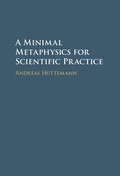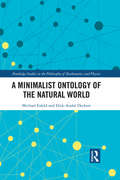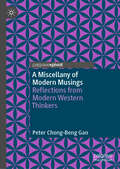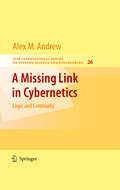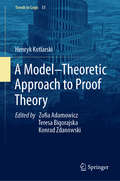- Table View
- List View
A Map of the Divine Subtle Faculty: The Concept of the Heart in the Works of Ghazali, Said Nursi, and Fethullah Gulen
by Mehmet Yavuz SekerThe heart in the Islamic understanding is the expression of a human being's spiritual existence. It is a Divine gift and Divine subtle faculty bestowed upon humanity. It is a polished mirror reflecting God. Like a general, the heart commands all other bodily organs and faculties, which are its troops, Everything that comes from a human being, whether good or bad, is a product of the heart. Mehmet Y. Seker, a scholar of Sufism and tasawwuf, studies the concept of the heart in the Islamic tradition looking at how it is approached by three prominent scholars and thinkers of Islam: Ghazali, Said Nursi, and Fethullah Gulen. Being the first in English to take as its focus the human heart from an Islamic spiritual, this book comparatively analyzes classical and modern age interpretations and evaluations on the concept and adds to the rich literature of spirituality in the Islamic tradition.
A Mark of the Mental: In Defense of Informational Teleosemantics (Life and Mind: Philosophical Issues in Biology and Psychology)
by Karen NeanderDrawing on insights from causal theories of reference, teleosemantics, and state space semantics, a theory of naturalized mental representation.In A Mark of the Mental, Karen Neander considers the representational power of mental states—described by the cognitive scientist Zenon Pylyshyn as the “second hardest puzzle” of philosophy of mind (the first being consciousness). The puzzle at the heart of the book is sometimes called “the problem of mental content,” “Brentano's problem,” or “the problem of intentionality.” Its motivating mystery is how neurobiological states can have semantic properties such as meaning or reference. Neander proposes a naturalistic account for sensory-perceptual (nonconceptual) representations. Neander draws on insights from state-space semantics (which appeals to relations of second-order similarity between representing and represented domains), causal theories of reference (which claim the reference relation is a causal one), and teleosemantic theories (which claim that semantic norms, at their simplest, depend on functional norms). She proposes and defends an intuitive, theoretically well-motivated but highly controversial thesis: sensory-perceptual systems have the function to produce inner state changes that are the analogs of as well as caused by their referents. Neander shows that the three main elements—functions, causal-information relations, and relations of second-order similarity—complement rather than conflict with each other. After developing an argument for teleosemantics by examining the nature of explanation in the mind and brain sciences, she develops a theory of mental content and defends it against six main content-determinacy challenges to a naturalized semantics.
A Marxist Critique of the Ruined University (Debating Higher Education: Philosophical Perspectives #15)
by Krystian Szadkowski Jakub KrzeskiThis book revitalizes the Marxian concept of critique for research into the transformation of universities. It consists of a set of comprehensive and interconnected theoretical tools, starting from the reflection on the political ontology of higher education, through the critique of political economy of the sector to the analysis of activist struggles within the universities, and back to the ontological concept of the common – a foundation for the university alternative design. The tools offered and discussed in context throughout the book allow for a productive use in overcoming the current crisis of the university, as well as to avoid the pitfalls present in contemporary debates around it. Unlike the dominant discussions on the university in crisis, the authors argue that to grasp its nature, one has to reach more profound than the level of appearances such as marketization and commodification. Szadkowski and Krzeski offer a compelling reappraisal of critique as a mechanism to liberate intellectual work. By linking critique to how knowledge is structured and commodified, they help us transcend reductionist narratives of a crisis-ridden University. Prioritising ontological renewal, they embrace the political and the common, enriching our collective ways of knowing the world as a movement. Pivoting around academic and student protests in Poland, the book enables us to imagine spaces and times of critical hope that resist the capitalist subjugation of intellectual activity to knowledge production. Richard Hall, Professor of Education and Technology, De Montfort University, Leicester, UK In the century since Antonio Gramsci new works in the Marxist tradition have made only modest contributions to social thought: the combined result of the savage repression in the West of the dangerous revolutionary ideas, plus the collapse in the East into jacobin conspiracy and dogmatism. If a living, vibrant Marxism had been part of the twentieth century mainstream then much catastrophe would have been averted. Now the drive for capital accumulation, sovereign individualism and rampant nationalism have brought us to the brink of ecological disaster and World War III. Into the void step two emerging scholars, Krystian Szadkowski and Jakub Krzeski with an original Marxist critique of higher education and the common good. There is hope in this development, vital resources for reflection, discussion and action. Simon Marginson, Professor of Higher Education at the Universities of Bristol and Oxford, UK, Honorary Professor at Tsinghua University in China, and Joint Editor in Chief of the journal 'Higher Education'
A Marxist History of Capitalism
by Henry HellerHenry Heller’s short account of the history of capitalism combines Marx’s economic and political thought with contemporary scholarship to shed light on the current capitalist crisis. It argues that capitalism is an evolving mode of production that has now outgrown its institutional and political limits. The book provides an overview of the different historical stages of capitalism, underpinned by accessible discussions of its theoretical foundations. Heller shows that capitalism has always been a double-edged sword, on one hand advancing humanity, and on the other harming traditional societies and our natural environment. He makes the case that capitalism has now become self-destructive, and that our current era of neoliberalism may trigger a transition to a democratic and ecologically aware form of socialism.
A Materialism for the Masses: Saint Paul and the Philosophy of Undying Life (Insurrections: Critical Studies in Religion, Politics, and Culture)
by Ward BlantonNietzsche and Freud saw Christianity as metaphysical escapism, with Nietzsche calling the religion a "Platonism for the masses" and faulting Paul the apostle for negating more immanent, material modes of thought and political solidarity. Integrating this debate with the philosophies of difference espoused by Gilles Deleuze, Michel Foucault, Jacques Derrida, Jacques Lacan, and Pier Paolo Pasolini, Ward Blanton argues that genealogical interventions into the political economies of Western cultural memory do not go far enough in relation to the imagined founder of Christianity.Blanton challenges the idea of Paulinism as a pop Platonic worldview or form of social control. He unearths in Pauline legacies otherwise repressed resources for new materialist spiritualities and new forms of radical political solidarity, liberating "religion" from inherited interpretive assumptions so philosophical thought can manifest in risky, radical freedom.
A Materialist Theory of Justice: A Methodological, Philosophical and Moral Justification
by Isaak DoreThis book presents a comprehensive theory of justice that has a threefold justification. For the first justification, the book presents a rigorously empirical methodology based on the stark realities of the human condition. It has a strong anthropological grounding in that it is adapted from the methodology of cultural materialism which, in turn, is founded on the materialist epistemology of Karl Marx. The second justification is philosophical. The theory of justice derived from the above methodology is further buttressed by and/or tested against the major trends of Western philosophy as represented by the thought of Aristotle, Thomas Hobbes, Thomas Aquinas, Immanuel Kant, Georg W. F. Hegel, John Finnis, John Dewey, George Mead, Jürgen Habermas, Michel Foucault, Jean-François Lyotard, Axel Honneth, Michael Sandel, Michael Walzer, Martha Nussbaum, John Maynard Keynes, Amartya Sen and Karl Marx. The third justification is moral. The promotion of human flourishing on the basis of fairness and equality are the minimum goals to be achieved; after which a more ambitious and comprehensive theory of overall goodness —based on individual and governmental action —can be implemented.
A Materialist Theory of the Mind (International Library of Philosophy)
by D.M. ArmstrongBreaking new ground in the debate about the relation of mind and body, David Armstrong's classic text - first published in 1968 - remains the most compelling and comprehensive statement of the view that the mind is material or physical.In the preface to this new edition, the author reflects on the book's impact and considers it in the light of subsequent developments. He also provides a bibliography of all the key writings to have appeared in the materialist debate.
A Materialist Theory of the Mind (Routledge Classics)
by D. M. ArmstrongD. M. Armstrong's A Materialist Theory of the Mind is widely known as one of the most important defences of the view that mental states are nothing but physical states of the brain. A landmark of twentieth-century philosophy of mind, it launched the physicalist revolution in approaches to the mind and has been engaged with, debated and puzzled over ever since its first publication over fifty years ago. Ranging over a remarkable number of topics, from behaviourism, the will and knowledge to perception, bodily sensation and introspection, Armstrong argues that mental states play a causally intermediate role between stimuli, other mental states and behavioural responses. He uses several illuminating examples to illustrate this, such as the classic case of pain. This Routledge Classics edition includes a new Foreword by Peter Anstey, placing Armstrong's book in helpful philosophical and historical context.
A Mathematical Approach to Marxian Value Theory: Time, Money, and Labor Productivity (Marx, Engels, and Marxisms)
by Dong-Min RieuThis book clarifies the quantitative relationship between time, money, and labor productivity from the perspective of Marxian labor theory of value. The book is divided into four main parts. Part I introduces the relationship between time and money in the context of Marxian value theory. Part II explores the theory of labor exploitation. Part III turns to analysis of the rate of profit, which is a primary characteristic of classical and Marxian economics. Part IV is devoted to suggesting a new research direction in light of the main conceptual innovation of the book.
A Mathematical History of the Golden Number
by Roger Herz-FischlerThe first complete, in-depth study of the origins of division in extreme and mean ratio (DEMR)-"the Golden Number"-this text charts every aspect of this important mathematical concept's historic development, from its first unequivocal appearance in Euclid's Elements through the 18th century.Readers will find a detailed analysis of the role of DEMR in the Elements and of its historical implications. This is followed by a discussion of other mathematical topics and of proposals by modern commentators concerning the relationship of these concepts to DEMR. Following chapters discuss the Pythagoreans, examples of the pentagram before 400 H.C., and the writings of pre-Euclidean mathematicians. The author then presents his own controversial views on the genesis, early development and chronology of DEMR. The second half of the book traces DEMR's post-Euclidean development through the later Greek period, the Arabic world, India, and into Europe. The coherent but rigorous presentation places mathematicians' work within the context of their time and dearly explains the historical transmission of their results. Numerous figures help clarify the discussions, a helpful guide explains abbreviations and symbols, and a detailed appendix defines terminology for DEMR through the ages.This work will be of interest not only to mathematicians but also to classicists, archaeologists, historians of science and anyone interested in the transmission of mathematical ideas. Preface to the Dover Edition. Foreword. A Guide for Readers. Introduction. Appendixes. Corrections and Additions. Bibliography.
A Mathematical Odyssey: Journey from the Real to the Complex
by Harold R. Parks Steven G. KrantzMathematics is a poem. It is a lucid, sensual, precise exposition of beautiful ideas directed to specific goals. It is worthwhile to have as broad a cross-section of mankind as possible be conversant with what goes on in mathematics. Just as everyone knows that the Internet is a powerful and important tool for communication, so everyone should know that the Poincaré conjecture gives us important information about the shape of our universe. Just as every responsible citizen realizes that the mass-production automobile was pioneered by Henry Ford, so everyone should know that the P/NP problem has implications for security and data manipulation that will affect everyone. This book endeavors to tell the story of the modern impact of mathematics, of its trials and triumphs and insights, in language that can be appreciated by a broad audience. It endeavors to show what mathematics means for our lives, how it impacts all of us, and what new thoughts it should cause us to entertain. It introduces new vistas of mathematical ideas and shares the excitement of new ideas freshly minted. It discusses the significance and impact of these ideas, and gives them meaning that will travel well and cause people to reconsider their place in the universe. Mathematics is one of mankind's oldest disciplines. Along with philosophy, it has shaped the very modus of human thought. And it continues to do so. To be unaware of modern mathematics is to miss out on a large slice of life. It is to be left out of essential modern developments. We want to address this point, and do something about it. This is a book to make mathematics exciting for people of all interests and all walks of life. Mathematics is exhilarating, it is ennobling, it is uplifting, and it is fascinating. We want to show people this part of our world, and to get them to travel new paths.
A Mathematical Prelude to the Philosophy of Mathematics
by Stephen PollardThis book is based on two premises: one cannot understand philosophy of mathematics without understanding mathematics and one cannot understand mathematics without doing mathematics. It draws readers into philosophy of mathematics by having them do mathematics. It offers 298 exercises, covering philosophically important material, presented in a philosophically informed way. The exercises give readers opportunities to recreate some mathematics that will illuminate important readings in philosophy of mathematics. Topics include primitive recursive arithmetic, Peano arithmetic, Gödel's theorems, interpretability, the hierarchy of sets, Frege arithmetic and intuitionist sentential logic. The book is intended for readers who understand basic properties of the natural and real numbers and have some background in formal logic.
A Mathematician's Journeys: Otto Neugebauer and Modern Transformations of Ancient Science (Archimedes #45)
by Alexander Jones John M. Steele Christine ProustThis book explores facets of Otto Neugebauer's career, his impact on the history and practice of mathematics, and the ways in which his legacy has been preserved or transformed in recent decades, looking ahead to the directions in which the study of the history of science will head in the twenty-first century. Neugebauer, more than any other scholar of recent times, shaped the way we perceive premodern science. Through his scholarship and influence on students and collaborators, he inculcated both an approach to historical research on ancient and medieval mathematics and astronomy through precise mathematical and philological study of texts, and a vision of these sciences as systems of knowledge and method that spread outward from the ancient Near Eastern civilizations, crossing cultural boundaries and circulating over a tremendous geographical expanse of the Old World from the Atlantic to India.
A Mathematician's Lament
by Paul Lockhart Keith Devlin"One of the best critiques of current mathematics education I have ever seen."--Keith Devlin, math columnist on NPR's Morning EditionA brilliant research mathematician who has devoted his career to teaching kids reveals math to be creative and beautiful and rejects standard anxiety-producing teaching methods. Witty and accessible, Paul Lockhart's controversial approach will provoke spirited debate among educators and parents alike and it will alter the way we think about math forever.Paul Lockhart, has taught mathematics at Brown University and UC Santa Cruz. Since 2000, he has dedicated himself to K-12 level students at St. Ann's School in Brooklyn, New York.
A Matter of Choice: The Decisive Effect on Human Affairs
by Philip HodgkissA Matter of Choice represents a substantive discussion of the concept of choice in human affairs, taken against the backdrop of ethics and religion. Drawing on a range of contributions, Hodgkiss demonstrates in this study that, though often not the primary issue under consideration, a concern with choice has featured continually in human thought from the Hellenistic world of the Stoics to the post-Kantian environment of modern philosophy. Moreover, he argues that the social and historical dimension of choice has been consistently underplayed, and that the role of choice in modern economic and political developments is underestimated at our peril. Through a critical account of the literature, Hodgkiss adeptly diagnoses the insufficiency of the current conception of the choice-making sovereign individual in the contemporary liberal-democratic capitalist context and outlines the implications of this philosophy for the choice-maker.
A Matter of Discourse: Community and Communication in Contemporary Philosophies (Routledge Revivals)
by Amós NascimentoFirst published in 1998. The emphasis upon differences, plurality and multiculturalism has led to an outpouring of information that has been interpreted by theories such as pragmatism, communitarianism, feminism, postmodern discourse and liberation ethics. Up to now, these issues have been seen as particular and external objects for theoretical discussion. This book goes to the heart of the matter and opens promising avenues for further philosophical reflection on these topics. Having the conception of communication in discourse theory as point of departure, scholars of distinct philosophical backgrounds move in and out of different contexts to offer a first-hand and in-depth account of the above positions in their dialogue with discourse theory. By establishing a web, they connect distinct issues that have been dealt with only separately thus far, without losing sight of differences. In the end, A Matter of Discourse shows that pluralism and multiculturalism are to be found within philosophy itself.
A Medical Educator's Guide to Thinking Critically about Randomised Controlled Trials: Deconstructing the "Gold Standard"
by Margaret MacDougallDrawing on the statistical and philosophical expertise of its authors, this book is designed to improve understanding and use of randomised controlled trials (RCTs) among health professionals. It is intended for use primarily by medical educators involved in teaching statistics and evidence-based medicine (EBM) to medical students, junior doctors and other health professionals. However, each of the chapters serves a wider range of interests, including the practical needs of physicians in interpreting research evidence to support clinical decision making and the teaching needs of philosophers of medicine who want to more fully appreciate how RCTs work in practice and provide engaging examples for their students. Rather than compete with the proliferating methodological literature on RCT designs, this book focuses on cultivating a healthy skepticism among developing health professionals to support critical appraisal of their own and published work on RCTs at a fundamental level, including through a more informed understanding of the place of subgroup analyses in sound statistical inference. Management of the positive predictive value in the statistical analysis of RCT findings is included as an important topic for contemporary medical curricula. In comparing RCTs with non-randomised studies, a search for empirical evidence for the superiority of RCTs is initiated, pointing to the need for further work to confirm what form this evidence should take.Medical educators will find a wealth of reasons to encourage their students to think more critically about how the RCT operates in practice as a gold standard.
A Metaphysics for the Future (Routledge Revivals)
by Robert AllinsonThis title was first published in 2001. This work is intended to serve not only as an expression of a new idea of a philosophy, but as an "apologia" for philosophy as a legitimate and independent discipline in its own right. It argues that in the 20th century, truth has not been abandoned, but merely modified. The text proposes a return to truth and suggests that it is only after apprehending the truths of consciousness that the philosopher's mirror may become a kaleidoscope through which reality may be contemplated. First order truth lies in the realm of discovery, and discovery takes place only within the moment of subjective re-enactment.
A Metaphysics of Platonic Universals and their Instantiations: Shadow of Universals (Synthese Library #428)
by José Tomás AlvaradoThis book offers a detailed defense of a metaphysics of Platonic universals and a conception of particular objects that is coherent with said metaphysics. The work discusses all the main alternatives in metaphysics of properties and tries to show why universals are the entities that best satisfy the theoretical roles required for a property. The work also explains the advantages of Platonic over Aristotelian universals in the metaphysics of modality and natural laws. Moreover, it is argued that only Platonic universals are coherent with the grounding profile required for universals. The traditional objections against Platonism are discussed and answered. The third part of the book, finally, offers a conception of particular objects as nuclear bundles of tropes that is coherent with the Platonic ontology of universals. This book is of interest to anyone that wants to understand the current –and intricate– debate in metaphysics of properties and its incidence in many other areas in philosophy.
A Metaphysics of Psychopathology (Philosophical Psychopathology)
by Peter ZacharAn exploration of what it means to think about psychiatric disorders as “real,” “true,” and “objective” and the implications for classification and diagnosis.In psychiatry, few question the legitimacy of asking whether a given psychiatric disorder is real; similarly, in psychology, scholars debate the reality of such theoretical entities as general intelligence, superegos, and personality traits. And yet in both disciplines, little thought is given to what is meant by the rather abstract philosophical concept of “real.” Indeed, certain psychiatric disorders have passed from real to imaginary (as in the case of multiple personality disorder) and from imaginary to real (as in the case of post-traumatic stress disorder). In this book, Peter Zachar considers such terms as “real” and “reality”—invoked in psychiatry but often obscure and remote from their instances—as abstract philosophical concepts. He then examines the implications of his approach for psychiatric classification and psychopathology.Proposing what he calls a scientifically inspired pragmatism, Zachar considers such topics as the essentialist bias, diagnostic literalism, and the concepts of natural kind and social construct. Turning explicitly to psychiatric topics, he proposes a new model for the domain of psychiatric disorders, the imperfect community model, which avoids both relativism and essentialism. He uses this model to understand such recent controversies as the attempt to eliminate narcissistic personality disorder from the DSM-5. Returning to such concepts as real, true, and objective, Zachar argues that not only should we use these metaphysical concepts to think philosophically about other concepts, we should think philosophically about them.
A Minimal Metaphysics for Scientific Practice
by Andreas HüttemannWhat are the metaphysical commitments which best 'make sense' of our scientific practice (rather than our scientific theories)? In this book, Andreas Hüttemann provides a minimal metaphysics for scientific practice, i.e. a metaphysics that refrains from postulating any structure that is explanatorily irrelevant. Hüttemann closely analyses paradigmatic aspects of scientific practice, such as prediction, explanation and manipulation, to consider the questions whether and (if so) what metaphysical presuppositions best account for these practices. He looks at the role which scientific generalisation (laws of nature) play in predicting, testing, and explaining the behaviour of systems. He also develops a theory of causation in terms of quasi-inertial processes and interfering factors, and he proposes an account of reductive practices that makes minimal metaphysical assumptions. His book will be valuable for scholars and advanced students working in both philosophy of science and metaphysics.
A Minimalist Ontology of the Natural World (Routledge Studies in the Philosophy of Mathematics and Physics)
by Michael Esfeld Dirk-Andre DeckertThis book seeks to work out which commitments are minimally sufficient to obtain an ontology of the natural world that matches all of today’s well-established physical theories. We propose an ontology of the natural world that is defined only by two axioms: (1) There are distance relations that individuate simple objects, namely matter points. (2) The matter points are permanent, with the distances between them changing. Everything else comes in as a means to represent the change in the distance relations in a manner that is both as simple and as informative as possible. The book works this minimalist ontology out in philosophical as well as mathematical terms and shows how one can understand classical mechanics, quantum field theory and relativistic physics on the basis of this ontology. Along the way, we seek to achieve four subsidiary aims: (a) to make a case for a holistic individuation of the basic objects (ontic structural realism); (b) to work out a new version of Humeanism, dubbed Super-Humeanism, that does without natural properties; (c) to set out an ontology of quantum physics that is an alternative to quantum state realism and that avoids any ontological dualism of particles and fields; (d) to vindicate a relationalist ontology based on point objects also in the domain of relativistic physics.
A Miscellany of Modern Musings: Reflections from Modern Western Thinkers
by Peter Chong-Beng GanThe book starts off by giving a quick overview of the main phases within the history of philosophy in the Western tradition. It then homes in on the “modern” phase and proceeds to select key thinkers that represent that slice from the rich intellectual heritage of the West. The main chapters have these thinkers’ names as heading. The work is meant to be expository and discursive, suited to introduce the neophyte in philosophy to some of the big questions asked by philosophers and their methods of addressing these questions as well as their unique proposed answers. The coverage is selective rather than extensive; and hence, only a small portion of the philosopher’s corpus of writings will be hand-picked and considered.
A Missing Link in Cybernetics: Logic and Continuity (IFSR International Series in Systems Science and Systems Engineering #26)
by Alex M. AndrewThe text begins by reviewing the origins and aims of cybernetics with particular reference to Warren McCulloch's declared lifetime quest of "understanding man's understanding". It is shown that continuous systems can undergo complex self-organization, but a need for classification of situations becomes apparent and can be seen as the evolutionary beginning of concept-based processing. Possibilities for complex self-organization are emphasized by discussion of a general principle that has been termed significance feedback, of which backpropagation of errors in neural nets is a special case. It is also noted that continuous measures come to be associated with processing that is essentially concept-based, as acknowledged in Marvin Minsky's reference to heuristic connection between problems, and the associated basic learning heuristic of Minsky and Selfridge. This reappearance of continuity, along with observations on the multi-layer structure of intelligent systems, supports a potentially valuable view of intelligence as having a fractal nature. This is such that structures at a complex level, interpreted in terms of these emergent measures, reflect others at a simpler level. Implications for neuroscience and Artificial Intelligence are also examined. The book presents unconventional and challenging viewpoints that will be of interest to researchers in AI, psychology, cybernetics and systems science, and should help promote further research.
A Model–Theoretic Approach to Proof Theory (Trends in Logic #51)
by Henryk KotlarskiThis book presents a detailed treatment of ordinal combinatorics of large sets tailored for independence results. It uses model theoretic and combinatorial methods to obtain results in proof theory, such as incompleteness theorems or a description of the provably total functions of a theory.In the first chapter, the authors first discusses ordinal combinatorics of finite sets in the style of Ketonen and Solovay. This provides a background for an analysis of subsystems of Peano Arithmetic as well as for combinatorial independence results. Next, the volume examines a variety of proofs of Gödel's incompleteness theorems. The presented proofs differ strongly in nature. They show various aspects of incompleteness phenomena. In additon, coverage introduces some classical methods like the arithmetized completeness theorem, satisfaction predicates or partial satisfaction classes. It also applies them in many contexts. The fourth chapter defines the method of indicators for obtaining independence results. It shows what amount of transfinite induction we have in fragments of Peano arithmetic. Then, it uses combinatorics of large sets of the first chapter to show independence results. The last chapter considers nonstandard satisfaction classes. It presents some of the classical theorems related to them. In particular, it covers the results by S. Smith on definability in the language with a satisfaction class and on models without a satisfaction class. Overall, the book's content lies on the border between combinatorics, proof theory, and model theory of arithmetic. It offers readers a distinctive approach towards independence results by model-theoretic methods.
